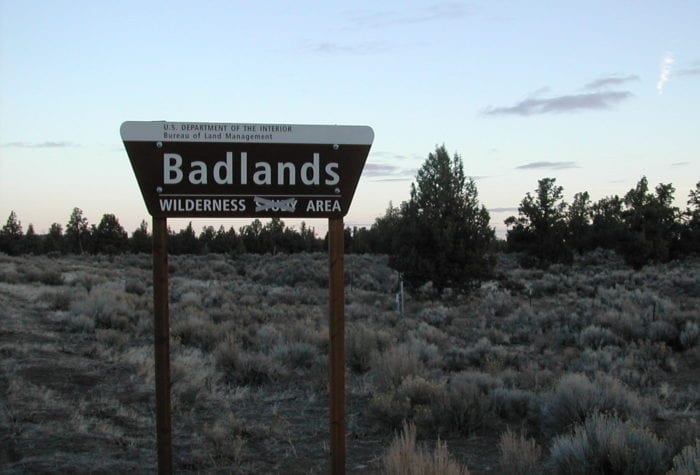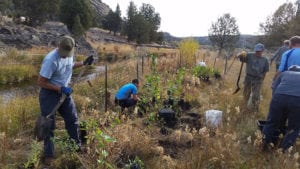Jake Place Planting #2
| Organizer: Jefferson Jacobs
Start Date: 10/10/2019 End Date: 10/13/2019 Region: Central Oregon Difficulty Rating: 3 out of 5 Maximum Group Size: 25 participants |
About the place
The South Fork of the Crooked River, has its source just to the south of the South Fork Crooked River Wilderness Study Area (WSA). After the river carves its way north through the canyon in the WSA it passes through a patchwork of BLM lands and private ranches before reaching the main stem of the Crooked River. The South Fork has been the historic home to anadromous fish, and has even been the site of successful redband reintroduction efforts in recent years. However, due to the eradication of beaver, riparian habitat loss from overgrazing, and irrigation withdrawals dewatering the creek, the river’s water temperatures have risen and habitat quality has plummeted.
About the stewardship work
Through a multi-pronged approach with private landowners, federal land managers, and ONDA, the situation will become significantly improved in the upper stretches of the river. ONDA is working to seek Wilderness protection for the WSA, as well as improved grazing practices within the river corridor portion of the WSA which is a designated Area of Critical Environmental Concern. In addition, ONDA has engaged with a private landowner who owns a large section of river frontage which borders the Wilderness Study Area. The landowner has removed all grazing from this sizable property (the “Jake Place”), and has partnered with ONDA to help with this important restoration effort. This trip continues a large-scale multi-year effort to completely revegetate the several miles of riparian habitat within the private land.
The objective of this trip is to plant about 1,000 potted native plants. Our species list this year will include aspen trees, dogwood, woods rose, snowberry, alder and more. All of these plants will be protected by exclosures (fence) to keep deer, elk and beaver from damaging them until they can sustain browse pressure. This year we will planting about half of the plants in pre-augured holes. As much as we can, we will also be adding cardboard weed mulch to the exclosures to reduce competition from weeds. No experience is necessary: We will teach you everything you need to know to work safely and ensure a high chance of survival for the plants. There is ample opportunity to work at your own pace and on aspects that work best with your physical capabilities.
View the map.
Trip timeline
- Thursday, October 10, 5 p.m.: Meet at the Jake Place on the South Fork of the Crooked River. This allows time for setting up camp, getting dinner, and a quick orientation about the plan for the coming day.
- Friday, October 11, 8 a.m. to 4 p.m.: A full day of planting at the work site, a short walk from camp.
- Saturday, October 12, 8 a.m. to 4 p.m.: A full day of planting at the work site, a short walk from camp.
- Sunday, October 13, 8 a.m.: Packing up camp after breakfast and heading home.
Camp
The landowner has a great camping area of scattered junipers along the river where we can spread out. However, there are really no particular improvements other than a fire pit and some tables. ONDA will provide some additional amenities such as shade/rain tarps, extra chairs, and a river-trip style porta-potty. The access road is an un-maintained dirt road, but it is not too much for a Subaru, or even a regular sedan driven carefully (in good weather).
Difficulty
We have reduced the difficulty of this trip from previous years by reducing the number of plants by half and working with the landowner to pre-augur many of the holes to reduce the amount of digging (and allow deeper holes). We will also have a wider variety of additional tasks available to switch up with. As always, everyone is encouraged to work at their own pace.
Trip highlights and challenges
- The challenge of getting a lot of plants in the ground: It will be a big two days of work, but we aim to get lots of folks helping out, and we have fewer than half the plants we typically plant on this trip.
- The satisfaction of making a large, relatively instantaneous, impact to a great area that I am sure you will love.
- Getting the chance to learn a lot about the ecological history of the area.
Participant responsibilities
Participants are responsible for their own food and camping gear, as well as transportation to and from the trip. As always car-pooling is encouraged. Sturdy off-trail ankle-high boots are required for this trip. Depending on the weather, it would be good to toss in a pair of rubber boots, especially if your other boots aren’t water proof. Participants should be prepared with clothing layers, food and water to spend the day away from camp to conduct the work. We recommend bringing your own work gloves to provide a comfortable fit: but it is not required. We will need folks to bring their own shovels (and a trowel if you like) although we will also have extras just in case. We recommend that each person bring 3 to 5 gallons of drinking water for the trip, since none is available on site.
Gear provided
ONDA will provide work gloves if you don’t have a pair, back-up shovels in case you don’t have one to bring, excellent guidance in the field, and a few group camping items to make things more comfortable (chairs, tables, dish-washing bins, campfire materials, water, shade/rain tarp, and a river-trip style porta-potty) We also provide hot water at morning and evening mealtimes to help expedite meal prep, and yummy coffee in the morning.
Registration
An ONDA registration application and medical form are required for this trip. Check the box next to each trip you would like to attend. You only need to fill this form out once per year.
Apply Now
What happens next?
You will receive a confirmation email within 10 working days of submitting your form. The confirmation email will provide information regarding which trips you are on the “participant list” for, and which trips are full, and therefore you have been placed on the “waitlist.”
Six weeks before the start of the trip, the trip leader will send out an RSVP to make sure everyone is still able to participate. Based on RSVPs, open spaces will be backfilled with people from the waitlist.
Three weeks before the trip start date, registered and confirmed participants will receive driving instructions, maps, car-pooling options, and additional information in an email sent by the trip leader
If you have any questions in the meantime, please don’t hesitate to contact the trip leader.
This trip will be led by ONDA's Riparian Restoration Coordinator Jefferson Jacobs. For questions about the trip call (541) 330-2638 or email jjacobs@onda.org.
ONDA's Restoration Work
Over the last two decades, ONDA has engaged volunteers in projects to plant thousands of trees, restore dozens of miles of streams, decommission old roads and remove enough barbed wire […]
Read More
